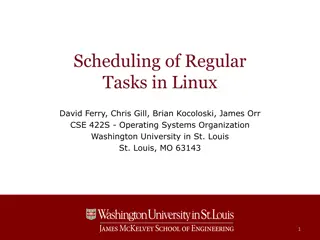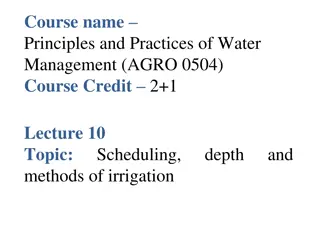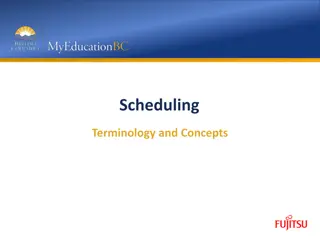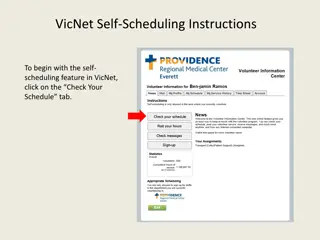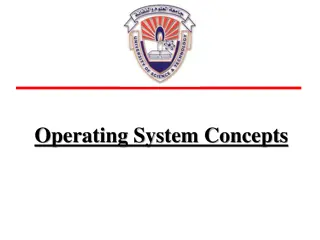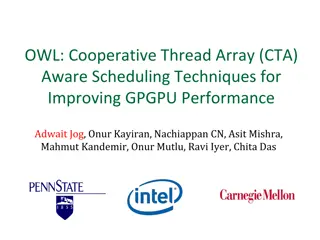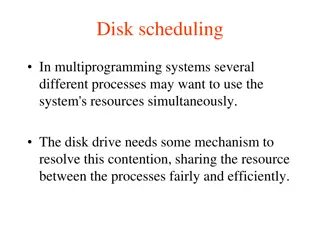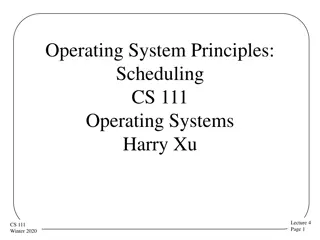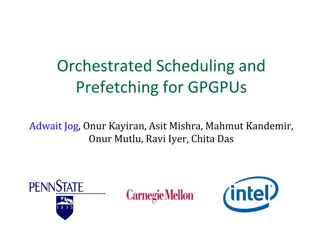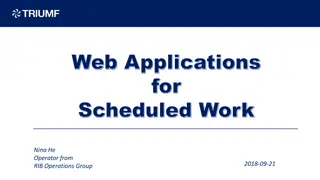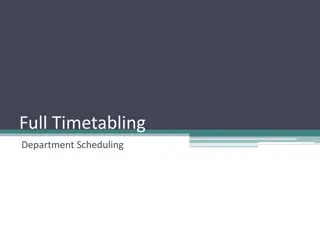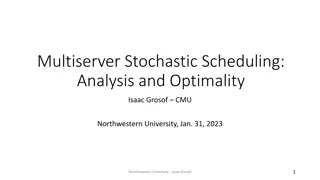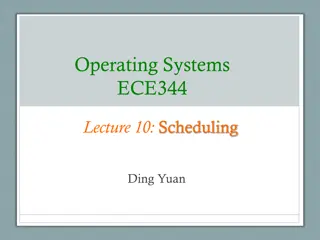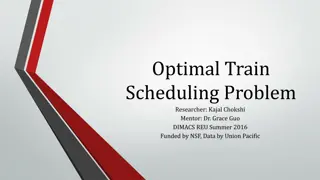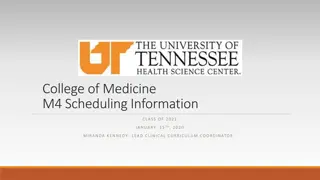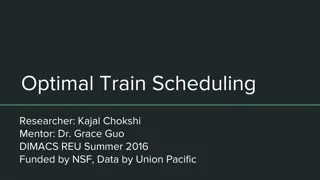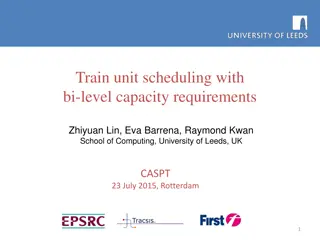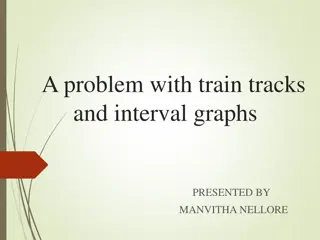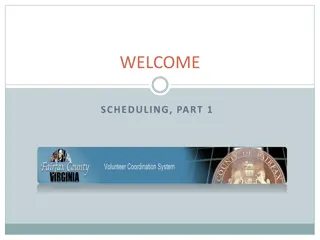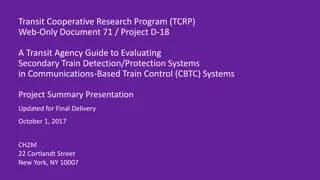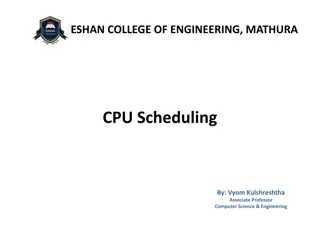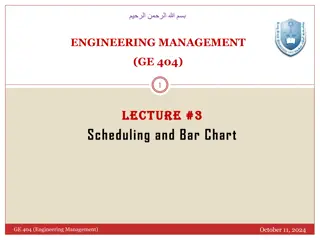Enhancing Student Success through Block Scheduling at KSU
National Institute for Student Success (NISS) diagnostic analysis at KSU shows the importance of block scheduling in increasing graduation rates and student engagement. Actions to increase registration for full-time schedules and improve student success are underway. The goals of KSU's block schedul
0 views • 10 slides
Understanding Linux Process Scheduling and Priorities
Delve into the intricacies of process scheduling in Linux systems, covering topics such as task prioritization, process states, scheduler decisions, and important scheduling scenarios. Learn about traditional scheduling concerns like throughput and latency, as well as different types of workloads su
1 views • 19 slides
Understanding Irrigation Scheduling for Optimal Crop Yield
Scientific irrigation scheduling plays a vital role in determining the correct timing and quantity of water application for crops to enhance yields efficiently while preserving soil quality. Various criteria are utilized in irrigation scheduling, such as potential evapotranspiration (PET) estimation
13 views • 58 slides
Enhanced Scheduling Method for Low Latency Traffic in IEEE 802.11-24/0091r1
This document presents an enhanced scheduling method for handling low latency traffic in IEEE 802.11 networks. It focuses on supporting deterministic and event-based latency-sensitive traffic, addressing challenges in scheduling and resource allocation. The proposed method aims to improve the reliab
8 views • 12 slides
Bike Transport by Train Parcel Cost Exploring Affordability, Barriers, and Benefits
Discuss the affordability of\u00a0bike transport by Train parcel cost, benefits, and common barriers to help you better understand the entire process. Read the blog and figure out what things you might\u2019ve missed. Visit \/\/ \/services\/bike-shifting-by-train
7 views • 3 slides
The Perfect Relocation: Know the Affordability of Bike Transport by Train Parcel
Concerned about your limited budget but still want to transport your bike to another city or location? The train can be your choice. How? You will figure it out once you read this blog till the end. We have mentioned a few critical reasons emphasizing the affordability of the\u00a0bike transport by
3 views • 2 slides
5 Guidelines You Must Follow For Safe and Smooth Car Parcel by Train in India
Taking your car by train in India might be a convenient and cost-effective choice. To ensure a seamless and hassle-free experience, you must follow certain laws and regulations. Let\u2019s take a look at the key guidelines for \u201ccar parcel by train\u201d in India with this simple post. Visit \/\
2 views • 2 slides
A Guide to Bike & Car Parcel by Train in India
If you are relocating for studies a job, or a simple change of lifestyle, you need to transport your home furniture safely and efficiently as it is important. Indian Railways operates the world's largest train network and is the primary form of transportation for luggage. You can also choose to move
1 views • 9 slides
Understanding Scheduling Terminology and Concepts in MyEdBC
Explore the key terminology and concepts related to scheduling in MyEdBC, including the Build view, scenarios, flat and rotated schedules, patterns, and base terms. Get insights into setting up scheduling structures and preferences, as well as managing course requests and staff information. Enhance
1 views • 13 slides
VicNet Self-Scheduling Instructions
Begin using the self-scheduling feature in VicNet by following step-by-step instructions, such as checking available shifts, selecting a day to volunteer, viewing specific times, scheduling yourself, and managing your shifts. Contact Volunteer Services for additional help or questions.
1 views • 6 slides
Positioning Considerations in IEEE 802.11bd for Vehicular Communication
Discussing the implications of IEEE 802.11mc and 802.11az improvements on Fine Timing Measurement (FTM) protocol for positioning in high mobility environments, particularly focusing on V2X communications and vehicle speeds up to 250 km/h. The document addresses positioning modes, interoperability, c
0 views • 7 slides
GPU Scheduling Strategies: Maximizing Performance with Cache-Conscious Wavefront Scheduling
Explore GPU scheduling strategies including Loose Round Robin (LRR) for maximizing performance by efficiently managing warps, Cache-Conscious Wavefront Scheduling for improved cache utilization, and Greedy-then-oldest (GTO) scheduling to enhance cache locality. Learn how these techniques optimize GP
0 views • 21 slides
Time-Aware Scheduling Capabilities in IEEE 802.11be
Describing necessary enhancements to enable Time-Aware Scheduling in IEEE 802.11be for time-sensitive applications. The focus is on aligning with the 802.1Qbv standard to address latency, jitter, and reliability issues, presenting a structured outline of requirements and configurations essential for
0 views • 24 slides
Understanding Scheduling Algorithms in Operating Systems
Exploring the world of scheduling in operating systems, this content covers various aspects such as introduction to scheduling, process behavior, bursts of CPU usage, CPU-bound and I/O-bound processes, when to schedule processes, and the differences between non-preemptive and preemptive scheduling a
0 views • 34 slides
Understanding CPU Scheduling in Operating Systems
In a single-processor system, processes take turns running on the CPU. The goal of multiprogramming is to keep the CPU busy at all times. CPU scheduling relies on the alternating CPU and I/O burst cycles of processes. The CPU scheduler selects processes from the ready queue to execute when the CPU i
1 views • 26 slides
Greedy Method for Task Scheduling Problems
The greedy method is a powerful algorithm design technique used in solving various optimization problems. In the context of task scheduling, we explore two specific problems: minimizing the number of machines needed to complete all tasks and maximizing the number of non-overlapping intervals on a si
1 views • 58 slides
Improving GPGPU Performance with Cooperative Thread Array Scheduling Techniques
Limited DRAM bandwidth poses a critical bottleneck in GPU performance, necessitating a comprehensive scheduling policy to reduce cache miss rates, enhance DRAM bandwidth, and improve latency hiding for GPUs. The CTA-aware scheduling techniques presented address these challenges by optimizing resourc
0 views • 33 slides
Simplifying Residency Shift Scheduling with Mathematical Programming Techniques
This project, led by Professor Amy Cohn and William Pozehl, aims to demonstrate how mathematical programming techniques can simplify the complex task of residency shift scheduling. The Residency Shift Scheduling Game highlights the challenges of manual scheduling and the ease of using mathematical p
1 views • 37 slides
Understanding Disk Scheduling in Multiprogramming Systems
In a multiprogramming system, several processes may contend for disk resources. Disk scheduling aims to efficiently share the disk drive's resources among processes, maximizing I/O request satisfaction while minimizing head movement. Various disk scheduling policies like FCFS, SSTF, and SCAN aim to
1 views • 22 slides
Understanding Operating System Scheduling Principles
Operating system scheduling involves making decisions on resource allocation among multiple clients, determining who gets to use the resource next and for how long. Different scheduling algorithms aim to achieve specific goals, such as maximizing throughput, minimizing waiting time, ensuring fairnes
0 views • 57 slides
Orchestrated Scheduling and Prefetching for GPGPUs
This paper discusses the implementation of an orchestrated scheduling and prefetching mechanism for GPGPUs to enhance system performance by improving IPC and overall warp scheduling policies. It presents a prefetch-aware warp scheduler proposal aiming to make a simple prefetcher more capable, result
0 views • 46 slides
Evolution of Shift Work Scheduling at an Accelerator Facility
Operators at an accelerator facility used to rely on manual processes and multiple systems for shift work scheduling and timesheet management. With the implementation of new interactive applications, the process has been streamlined, allowing for better planning, efficient submission of timesheets,
0 views • 32 slides
Efficient Department Scheduling for Timetabling Success
Efficient timetabling for a department involves various stages like data entry, draft timetable creation, feedback collection, production of the final timetable, schedule adjustments, and publication. Key information needed includes faculty availability, room inventory, specific scheduling parameter
0 views • 59 slides
Multiserver Stochastic Scheduling Analysis
This presentation delves into the analysis and optimality of multiserver stochastic scheduling, focusing on the theory of large-scale computing systems, queueing theory, and prior work on single-server and multiserver scheduling. It explores optimizing response time and resource efficiency in modern
0 views • 38 slides
Minnesota E-Crash Train the Trainer Course Overview
Explore the Minnesota E-Crash Train the Trainer Course, approved by the Department of Public Safety and Post Board for continuing education credit. Learn about the purpose of the training, the Minnesota E-Crash application, and highlights including Quick Capture and Built-in Map-It components. Get i
0 views • 12 slides
Understanding Scheduling in Operating Systems: A Comprehensive Overview
This content delves into the intricate details of scheduling in operating systems, covering the goals, various scheduling algorithms, multiprogramming concepts, decision-making processes for resource allocation, timing considerations, scheduling objectives, and performance criteria such as throughpu
0 views • 42 slides
Optimal Train Scheduling Research Project Overview
Research project led by Kajal Chokshi and Dr. Grace Guo in the DIMACS REU Summer 2016, funded by NSF and supported by Union Pacific data. Focuses on optimizing train scheduling on single tracks to minimize cost and delay. Utilizes a dataset of 250K records for 6 weeks of single track train schedules
0 views • 25 slides
College of Medicine M4 Scheduling Information for Class of 2021
Important scheduling timeline information for 4th-year medical students at the College of Medicine. Key dates include deadlines for hardship requests, core clerkship preferences, Geriatrics/Palliative Medicine enrollment, scheduling rounds, and publication rules. Compliance with specific requirement
0 views • 8 slides
Optimal Train Scheduling Research at DIMACS REU
Research conducted by Kajal Chokshi and Dr. Grace Guo at DIMACS REU in 2016 focused on scheduling trains on single tracks to optimize operations, considering various constraints such as train conflicts, overtaking, and delays. The study analyzed datasets from Union Pacific to create models for decis
0 views • 9 slides
Train Unit Scheduling Study: Optimal Capacity Management Approach
This study focuses on optimizing train unit scheduling by satisfying capacity requirements and minimizing operating costs. The research addresses imbalanced demands and under-utilized train units, proposing solutions for re-balancing. It explores integer multicommodity flow representation and method
0 views • 33 slides
Competitive Value Train Analysis for International Trade Challenge
Explore the challenge of growing together in the Americas through digitalization for international trade by presenting a Competitive Value Train and identifying associated firms. Utilize digital tools to map out the customer journey effectively and ensure all required information is included. Follow
0 views • 7 slides
Recent Train Times: A Guide for Running Reports and Interrogating Train Information
Recent Train Times is a publicly available website that consolidates train running information for passenger services across England, Scotland, and Wales. This guide explains how to run basic searches, understand the results, and interrogate individual train running information. Users can access up
0 views • 4 slides
Solving Train Track Problems Using Interval Graphs and Graph Coloring
Presented by Manvitha Nellore, this content addresses real-world train track problems in busy cities by proposing solutions through interval graphs and graph theory. The approach involves allotting tracks to trains by scheduling with time intervals to avoid conflicts. An interval graph is defined, a
0 views • 15 slides
Improving Job Scheduling with Nudge Policy
Explore the innovative Nudge policy for stochastic improvement upon First-Come-First-Served (FCFS) scheduling. The Nudge policy introduces a new approach with better performance tradeoffs compared to traditional scheduling methods. Discover how Nudge outperforms FCFS across various job size distribu
0 views • 21 slides
Job Scheduling Across Geo-distributed Datacenters
Scheduling jobs across geo-distributed datacenters poses challenges such as optimizing job completion time, reducing data transfer costs, and coordinating tasks across multiple locations. Various strategies like reordering-based approaches and scheduling heuristics are explored to enhance job schedu
0 views • 32 slides
Insights into Volunteer Scheduling and Management
Exploring the intricacies of volunteer scheduling, this informative guide covers topics such as creating schedule slots, weighing the pros and cons of scheduling, opportunity scheduling, monthly calendars, slot summaries, volunteer and opportunity listings, and more. Dive into the world of volunteer
0 views • 21 slides
Transit Agency Guide for Evaluating Secondary Train Detection/Protection Systems in CBTC
This project conducted by TCRP aims to provide guidelines for transit agencies to evaluate the necessity of secondary train detection/protection systems or alternative operating practices when implementing Communications-Based Train Control (CBTC) systems. The research team at CH2M has been working
0 views • 48 slides
University Space Scheduling Guidelines
University space scheduling guidelines prioritize academic courses and campus use, emphasizing the need for more available space. The policy outlines expectations, scheduling guidelines, and the management of laboratory and studio spaces. It also addresses the direct scheduling of such spaces for sp
0 views • 14 slides
Understanding CPU Scheduling Concepts at Eshan College of Engineering, Mathura
Dive into the world of CPU scheduling at Eshan College of Engineering in Mathura with Associate Professor Vyom Kulshreshtha. Explore topics such as CPU utilization, I/O burst cycles, CPU burst distribution, and more. Learn about the CPU scheduler, dispatcher module, scheduling criteria, and the impl
0 views • 18 slides
Overview of Project Scheduling in Engineering Management
The lecture covers planning and scheduling in engineering management, focusing on activity and event scheduling techniques, bar charts, critical path analysis, and addressing project scheduling principles. It discusses the objectives of the lecture, the difference between planning and scheduling, th
0 views • 29 slides

